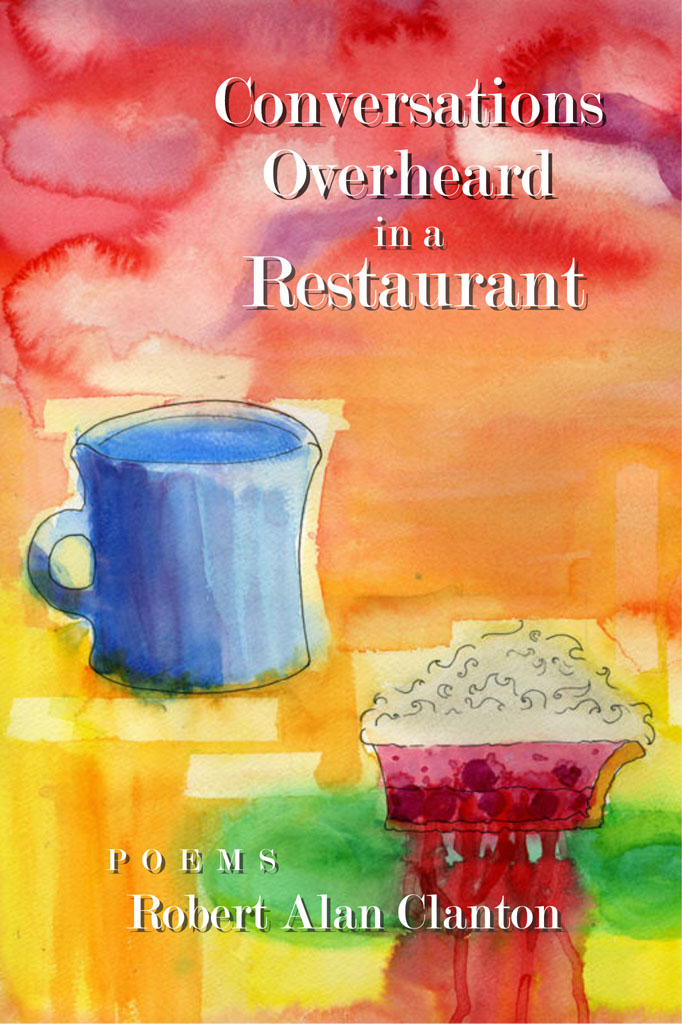The poems in Conversations Overheard in a Restaurant were selected from two previous unpublished collections, The Geometry of Clouds (75 poems written between 1988 and 1999), and Transparent Moon (material written between 1999 and 2008). Conversations Overheard also includes several new poems not part of those two previous collections. These works include Peace River, Chapel of the Transfiguration and Physics 101. Apalachicola Bay is the oldest poem in Conversations Overheard; it dates back to the spring of 1988. North of the Caldera Boundary is the newest—it was completed in September of 2009 after a visit a few months earlier to Yellowstone National Park.
In my original plan for this book, still tentatively titled Transparent Moon, I had organized poems into highly specific chapters: one section of poetry about youth—period piece stories of childhood, middle school, high school and young adult years—followed by a section comprised of poems about nature, and then another section of contemporary themes. But this hyper-organized arrangement soon seemed strained and unnecessary. It also became clear to me that the chronological structure forced some weaker poems into the mix simply for the sake of building bridges between one vignette and the next.
Suspending my obsessive-compulsive desire for order, I shuffled the deck and started over. I spread out all the poems on my dining room table and on the floor, then, using a bit of intuition and patience, reassembled them into a more relaxed, freeform arrangement. I also killed the original title and sent the flagship poem, Transparent Moon, into the penalty box along with many others. Less was more.
But this left me without a title. I considered reverting back to the title of my first major set, The Geometry of Clouds, but each time I tried to envision the words on a book cover, it made me a bit squeamish. I also considered reusing the title of my original collection from my days at Florida State University, Godzilla Versus Opie Taylor. This had been the title of my English Department Honors Thesis and the core group of poems which had won me an undergraduate poetry prize in the late 1980s. But in the two or three year run-up for planning this book, an attorney friend had suggested that the names Godzilla and Opie Taylor might—just might—run me afoul of some arcane copyright or trademark law. “Great,” I said, “at least that would generate some publicity for the book.”
So I then turned inward, churning through poem titles already included in the soon-to-be-published collection in search of something that rang true but would also look good on the bookshelf at my nearby Barnes & Noble. A few poem titles came close to making the grade: Resurrection Fern; Leaving Your Baggage on the Tracks (a leading contender for a few months); and Confessions to the Mountains, for which I even went to the trouble of creating a digital mock-up using a photograph I had taken at Crater Lake in 2008, complete with a nice Garamond font. Other poems on the short list for title honors included The Possessions of Sleep and Moon Rise, Atlantic Beach, Florida.
But none of these contenders quite filled the bill. Then I remembered my friends Wayne and Pam had once commented that I seemed to write a lot of poems about food and cooking and meals in restaurants. This had led them to the half-joking suggestion that I title my next Office Depot binder of poems More Damned Poems About Recipes & Food, which had faint echo of the Talking Heads.
Except that anyone who knows me knows that I rarely “cook” in the traditional sense, unless you consider a recipe which begins with the phrase empty contents of can into small saucepan and warm over medium heat to be cooking. Sure, I know some actual chefs from my days of producing a cooking show for television—like my friend Chef Michael, who once, while telling a joke about a Cajun fellow at an airport, caused part of our set scenery to fall down while we were videotaping. And I have in fact “cooked” on a few occasions, though I am helpless without a user-friendly recipe to guide me through my kitchen.
But my friends Wayne and Pam had planted an important seed. In addition, during the taping of one of those very cooking shows, I spoke to a waitress who told me she intended one day to write a short novel—a collection of short stories, really—based on the snippets of conversation she often encountered when delivering food or drinks to tables in restaurants—just fragments of things overheard: real estate deals, steamy sexual affairs, drunken escapades, hot stock market tips, felony works-in-progress.
At the time I started to actually work on this book, I had decided to include several of the food-related, restaurant-themed poems, including Recipe for Pasta Primavera and Conversation Overheard in a Restaurant in Poncha Springs, Colorado. So the title sprang from that context.
Oddly enough, I ended up removing a few additional poems about cooking and food during the final round of cuts, including Conversation in a Pizza Hut (to be posted on this website in the near future) and Iranian Recipe (see the link under More Poems). The poem titled Recipe for Champurrado very nearly did not make the final cut, but a bit of self-censoring (two or three lines were cut) made it acceptable, perhaps, to the mainstream poetry reading audience.
So now a few notes about specific poems for the curious or the bored:
A God Named Joey. I get more questions about this poem than any other. Most people want to know if the story of a grammar school boy hanging himself back in the mid-1960s is true. Yes. Glenn Davenport was my classmate for several years at Ruth N. Upson Elementary school in Jacksonville, Florida. He went missing one night and was discovered early the next morning hanging from an old oak tree in a small empty lot about one block from the school. The police concluded that he had accidentally hanged himself while playing in that area, which is the context for my childhood memory of those events. There is an alternate theory that he was murdered and placed in the tree by parties never identified, possibly a sexual predator. This is why his sister maintains a vigilant effort to this day to seek more information about Glenn’s death.Sunday Chiffon Pie, November 1996. This poem was the inspiration—more or less—for Sarah Herrin’s watercolor art for the book cover. The poem has also caused some minor controversy with a few football fan friends who dispute the opinions expressed therein.
Random Things Culled from a World Almanac & Books of Facts. Yes, I really did hit my brother with a metal pipe, probably six to eight feet long, back when we were playing in our babysitters backyard when we were kids. But in my defense, I didn’t plan to hit him. The pipe just fell and he failed to catch it. I swear. Anyway, he survived with a minor cut and no concussion and he lives and works today in Seattle….as a welder of metal pipes.
The Wind Above the Garden. This poem is dedicated to Sherrie Stroh, who died of cancer at the age of 35 in 1998.
Sunset. This poem is dedicated to Carl E. Harris, who died of lung cancer at the age of 77 in 2003.


